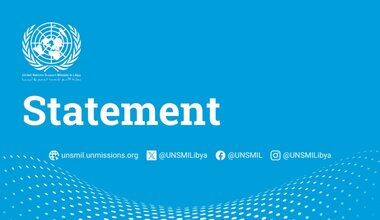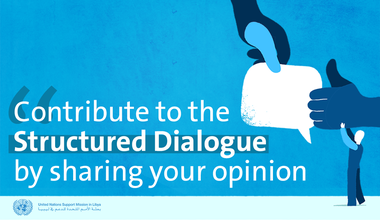Conference on Truth and Reconciliation in Libya Concludes with Recommendations on the Way Forward
A conference on truth-seeking and reconciliation in Libya, which was convened in the Libyan Capital, Tripoli, on 12-13 December, concluded its deliberations with a set of recommendations on the way forward to tackle this crucial aspect of Libya's democratic transition.
The Conference brought together around one-hundred Government officials, members of the Fact-Finding and Reconciliation Commission, members of the General National Congress, members of the Council of Wise Men (Hukama), representatives from the Ministry of Martyrs and Missing Persons, civil society and victim groups, and individual experts as well as members from the diplomatic community. Participants hailed from throughout Libya. International experts, including from South Africa, Peru and Tunisia, shared their countries' respective experiences in dealing with their past.
The conference was organized by the United Nations in partnership with the Fact-Finding and Reconciliation Commission and the Human Rights Committee of the General National Congress..
The participants discussed the relevance and challenges of truth-seeking, including the legal and institutional framework, and the role of victim groups. The conference also examined the role of the Fact-Finding and Reconciliation Commission and that of tribal leaders in reconciliation.
In recommendations after two days of deliberations, the conference called on Libyan authorities to display the political will necessary to pursue transitional justice.
The Conference recommended that the government, with assistance from the United Nations, should seek urgently to improve security and create the conditions for truth-seeking, including in due course through the demobilization and disarmament of illegal brigades; improve the role of the media, which has the potential for broadening social dialogue and should be encouraged to play a more positive role; assist in developing the performance, capacity and independence of the judiciary; immediately resolve the issue of detainees currently held outside the scope of the law, screen them and release those against whom there is no sufficient evidence, and try those who bear the greatest responsibility for crimes committed by the former regime.; and create the conditions for return of the displaced persons.
Participants highlighted that Libyans want to move beyond their past and that reconciliation is an important part of strengthening Libyan democracy. The conference said Libya can draw on its Islamic heritage and rich cultural traditions to promote reconciliation.
The conference recognized the need for more dialogue between the different stakeholders in the reconciliation process and participants called on the United Nations to assist in such a dialogue.
Participants also agreed that truth, justice and reparations are essential to reconciliation and concrete steps should be identified in these areas.
Participants stressed that politics should be kept away from the transitional justice process and emphasized the need to include women in all stages of this process. The conference welcomed the minister of justice's efforts to a new law on transitional justice.
Describing truth-seeking as a cornerstone of reconciliation, the conference said the Libyan government should ensure the process is socially dynamic and broad in its approach, adding that civil society is a crucial partner in the transitional justice process. The conference said the rights of victims should be recognized and recommended that those who committed violations in the past should be excluded from public life based on their conduct rather than affiliation.
Participants had come to the conference with high hopes that it would help kick-start a crucial aspect of Libya's democratic transition that has been regularly overshadowed by other important national priorities, in particular in the security and political fields.
"Truth-seeking and transitional justice are an important part of Libya's program to exit the revolution mode to that of the State," the Libyan Minister of Justice, Salah Marghani, said at the opening of the conference.
 |
| Special Representative of the Secretary-General for Libya Tarek Mitri addresses the conference |
Special Representative of the Secretary-General for Libya Tarek Mitri stressed in his remarks at the opening session that the process is not only important for stability but also for the future of Libya's democratic transition.
"Reconciliation is necessary for establishing security and launching human development," Mr. Mitri said. "This process, if managed well and without haste or partisanship, can set the broad lines of a new social contract, which is the cornerstone of the new constitution", he added.
GNC member Amina Al-Megheirbi noted in her remarks that Libyans must benefit from the experiences of others in the field, adding that the process consolidates the culture of accountability versus impunity and serves as deterrent for future crimes.
She pointed out that the priority is for the file of the displaced. "They are our people who are suffering and there has to be solution as soon as possible," she said.
| Mohsen Al-Sehbani, of the Tunisian Ministry of Human Rights and Justice |
Mohsen Al-Sehbani, of the Tunisian Ministry of Human Rights and Justice and coordinator of the technical committee overseeing national dialogue on transitional justice, said the conference would help promote the process.
"We expect the participants to absorb more the importance of the idea of transitional justice and its concept and mechanism, and for decision-makers to understand the importance of involving people who are active in this field," he said in an interview.
Libyans who participated in the conference had varying views.
 |
| Sheikh Abdelafi Abdullah Abu Jarida |
Sheikh Abdelafi Abdullah Abu Jarida, a teacher and educational inspector who travelled around the country and engaged in problem-solving, described the difficulties the process entails.
"The biggest problem is that of property and of blood, meaning those crimes committed whereby whole families have been raped and the male members killed after the slowest and most excruciating torture," he said in an interview.
 |
| Haajer Muhamad al-Qaed, GNC member from Yifrin |
Haajer Muhamad al-Qaed, GNC member from Yifrin, is daughter of a Libyan killed in the Abu Salim massacre in 1996, in which about 1,200 inmates were shot dead by the Gadhafi regime. Nevertheless, she believes in reconciliation.
"If we want to build a rule-based state, this cannot be done through criminalizing the families of the perpetrators of crimes or by widening the circle of blame too far," she said in an interview. "Blame must be sought for the killers and not for their families. We cannot depend on the law of the jungle, especially when we are struggling to get out of the jungle."
Majda al-Falah, a GNC member from Hay al-Andalus, Tripoli, sees "the priority and necessity right now is to get to our constitution."
As for the role of the United Nations, Mitri, the UN representative, said the organization will continue to offer assistance at the Libyans' request. "Continuously reminding of the importance of reconciliation and contributing to providing favourable conditions for it are at the heart of our duties", he said.
He expressed confidence that the conference can be built upon. "I hope will not be a passing event, but rather a defining moment in a continuous path."
 United Nations Peacekeeping
United Nations Peacekeeping UN
UN













